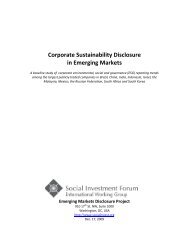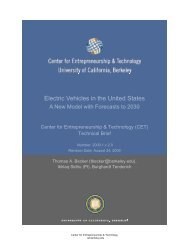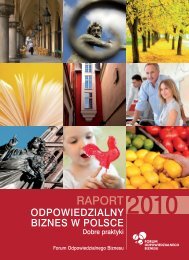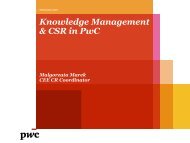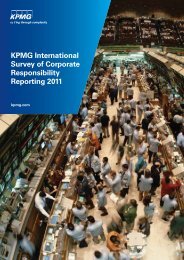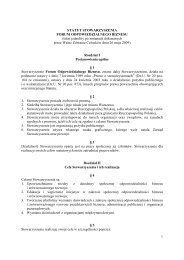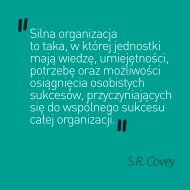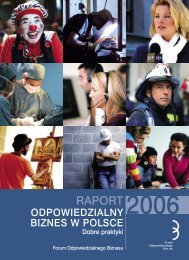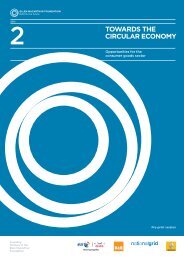communities and citizenship - Havas Worldwide Prosumer Reports
communities and citizenship - Havas Worldwide Prosumer Reports
communities and citizenship - Havas Worldwide Prosumer Reports
You also want an ePaper? Increase the reach of your titles
YUMPU automatically turns print PDFs into web optimized ePapers that Google loves.
HAVAS WORLDWIDE<br />
®<br />
Vol. 15, 2013<br />
COMMUNITIES AND CITIZENSHIP:<br />
Redesigned for a New World
Our findings are drawn from responses to an online<br />
survey of 10,219 men <strong>and</strong> women in 31 countries:<br />
Argentina, Australia, Belgium, Brazil, Canada, Chile, China,<br />
Colombia, the Czech Republic, the Dominican Republic,<br />
Finl<strong>and</strong>, France, Germany, India, Italy, Japan, Kazakhstan,<br />
Kuwait, Malaysia, Mexico, Russia, Saudi Arabia,<br />
Singapore, South Africa, Spain, Taiwan, Turkey, Ukraine,<br />
the United Arab Emirates, the United Kingdom, <strong>and</strong><br />
the United States. The respondent base is made up of<br />
79 percent mainstream consumers <strong>and</strong> 21 percent<br />
leading-edge <strong>Prosumer</strong>s; we pay particular attention to<br />
the latter group because what they are thinking <strong>and</strong> doing<br />
today is a good indication of what the mainstream will<br />
be thinking <strong>and</strong> doing in the near future. The survey was<br />
fielded by Market Probe International in summer 2012.<br />
CANADA<br />
MEXICO<br />
U.S.<br />
DOMINICAN REPUBLIC<br />
A note about the data: In this report, we explore global responses, with an<br />
emphasis on distinctions between <strong>Prosumer</strong>s <strong>and</strong> the mainstream, as well as<br />
the various age groups. Where warranted, additional data is provided but not<br />
necessarily included in the data graphics. Country-specific findings are available<br />
to <strong>Havas</strong> <strong>Worldwide</strong> colleagues <strong>and</strong> clients in a supplemental brochure.<br />
COLOMBIA<br />
BRAZIL<br />
CHILE<br />
ARGENTINA<br />
Table of Contents<br />
4<br />
6<br />
10<br />
INTRODUCTION<br />
THE DECLINE OF POLITICS<br />
NEW COMMUNITIES AND DRIVERS OF CHANGE<br />
2 <strong>Prosumer</strong> Report, Vol. 15
FINLAND<br />
RUSSIA<br />
U.K.<br />
GERMANY<br />
CZECH<br />
REPUBLIC<br />
FRANCE<br />
BELGIUM<br />
UKRAINE<br />
KAZAKHSTAN<br />
SPAIN<br />
ITALY<br />
TURKEY<br />
CHINA<br />
JAPAN<br />
KUWAIT<br />
U.A.E.<br />
SAUDI ARABIA<br />
INDIA<br />
TAIWAN<br />
MALAYSIA<br />
SINGAPORE<br />
SOUTH AFRICA<br />
31<br />
COUNTRIES<br />
AUSTRALIA<br />
16<br />
18<br />
22<br />
CONSUMERS, BUSINESS & STATE: NEW ROLES & RELATIONSHIPS<br />
UNPRECEDENTED OPPORTUNITY FOR BUSINESSES & BRANDS<br />
CONCLUSION<br />
Communities <strong>and</strong> Citizenship: Redesigned for a New World 53
“LIKE THE BODY THAT IS MADE UP OF DIFFERENT LIMBS<br />
AND ORGANS, ALL MORAL CREATURES MUST DEPEND<br />
ON EACH OTHER TO EXIST.” —HINDU PROVERB<br />
D<br />
isaffection with modern life is a hallmark of our time. Earlier studies by<br />
<strong>Havas</strong> <strong>Worldwide</strong> have shown that people bemoan our perceived loss of<br />
substance, growing laziness (physical <strong>and</strong> mental), <strong>and</strong> decline in civility.<br />
Most think society is moving in the wrong direction. And yet overriding these<br />
complaints is an enduring sense of optimism <strong>and</strong> purpose. People believe strongly<br />
in society’s ability to change <strong>and</strong> are convinced that tomorrow will be better than<br />
today. This confidence has its roots in the belief that they—<strong>and</strong> millions of others<br />
like them—are empowered to create change <strong>and</strong> that the world is finally ready to<br />
grow up <strong>and</strong> make progress something worth dreaming about again.<br />
46 <strong>Prosumer</strong> Report, Vol. Vol. 15 15
IN THIS WHITE PAPER,<br />
we look at the emergence of a new<br />
approach to <strong>citizenship</strong>.<br />
One that:<br />
Is linked not so much to voting as to doing<br />
Relies less on political parties <strong>and</strong> elected leaders <strong>and</strong><br />
more on individuals <strong>and</strong> businesses<br />
Is centered on <strong>communities</strong> bound by common interests<br />
<strong>and</strong> goals rather than by heritage, blood lines, or locality<br />
Is more pragmatic <strong>and</strong> measurable <strong>and</strong> less ideological<br />
Is fueled by social media<br />
71 %<br />
PROSUMERS<br />
58 %<br />
MAINSTREAM<br />
“Tomorrow will be better than today”<br />
(Showing % agreeing strongly/somewhat)<br />
86 %<br />
PROSUMERS<br />
73 %<br />
MAINSTREAM<br />
“Change is good”<br />
(Showing % agreeing strongly/somewhat)<br />
Communities <strong>and</strong> Citizenship: Redesigned for a New World 5
THE DECLINE OF POLITICS<br />
We Don’t Trust Our Political Leaders<br />
to Do Their Jobs<br />
In the last 12 months, which of these have you done?<br />
(Showing % that selected each statement)<br />
65<br />
62<br />
52<br />
51<br />
47<br />
39 39<br />
29<br />
41<br />
27<br />
36<br />
26<br />
Recycled regularly Donated to charity Voted in an election Signed a petition Taken steps to reduce<br />
my carbon footprint<br />
Donated money<br />
to a cause<br />
6 <strong>Prosumer</strong> Report, Vol. 15<br />
35
A<br />
common thread binds our survey respondents, regardless<br />
of under what form of government they live: They don’t<br />
trust their political leaders to do their jobs. Only 39 percent<br />
of the total sample express even moderate faith in their national<br />
governments, while only slightly more (42 percent) evince faith in<br />
local government. When we look at those who have “a lot of faith”<br />
in government, the numbers plunge to less than 10 percent for<br />
both national <strong>and</strong> local.<br />
Why are so many people mistrustful of their political leaders?<br />
In some cases, corruption <strong>and</strong> sc<strong>and</strong>al play a role. We see it all<br />
over the globe: While China grapples with reports of nepotism <strong>and</strong><br />
abuse of power, its neighbor to the south has seen a groundswell<br />
of support for India Against Corruption, a grassroots movement<br />
dem<strong>and</strong>ing comprehensive reform. In the United Kingdom, recent<br />
brouhahas have included the “cash for access” sc<strong>and</strong>al <strong>and</strong><br />
criticisms of Scotl<strong>and</strong> Yard’s h<strong>and</strong>ling of the News of the World<br />
case. And a July 2012 survey by Gallup found that 87 percent of<br />
Americans want the president to make reducing corruption in the<br />
federal government a top priority, second only to the 92 percent<br />
who want him to focus on creating jobs.<br />
There is also widespread concern over lack of leadership<br />
<strong>and</strong> governments’ perceived inability to respond quickly <strong>and</strong><br />
effectively to the mounting challenges we face. For instance,<br />
more than 7 in 10 <strong>Prosumer</strong>s in Japan <strong>and</strong> 54 percent of the<br />
mainstream told us they trust their national government less<br />
in the aftermath of that country’s March 2011 triple disaster.<br />
And more than two-thirds of global <strong>Prosumer</strong>s (67 percent)<br />
<strong>and</strong> 55 percent of the mainstream think corporations are better<br />
equipped than governments to combat climate change.<br />
This sense that our political institutions are hampered by<br />
corruption, ineptitude, or simple inaction is leading many of us<br />
to pull back from political activity <strong>and</strong> to look instead for other<br />
ways to have a voice <strong>and</strong> contribute to positive change.<br />
Indicate the degree to which you have faith in the following institutions:<br />
(Showing % having moderate/a lot of faith)<br />
100<br />
100<br />
100<br />
100<br />
100<br />
80<br />
80<br />
80<br />
80<br />
80<br />
60<br />
60<br />
60<br />
60<br />
60<br />
40<br />
20<br />
65<br />
40<br />
20<br />
62<br />
40<br />
40<br />
40<br />
20<br />
20<br />
20<br />
0<br />
52 0<br />
51<br />
0<br />
0<br />
0<br />
NONPROFIT ORGANIZATIONS/ NGOs NEWS MEDIA 47 ORGANIZED RELIGION MY LOCAL GOVERNMENT MY NATIONAL GOVERNMENT<br />
39 39<br />
41<br />
36<br />
29<br />
27<br />
26<br />
PROSUMERS MAINSTREAM AGE 18–3 4 AGE 35–5 4 AGE 55+<br />
Recycled regularly<br />
35<br />
22<br />
Donated to charity Voted in an election Signed a petition Taken steps to reduce<br />
my carbon footprint<br />
25<br />
17<br />
18 14<br />
16<br />
11<br />
15<br />
8<br />
Donated money<br />
to a cause<br />
<strong>Prosumer</strong>s<br />
Mainstream<br />
7 7<br />
Volunteered for a<br />
cause I support<br />
Boycotted a<br />
company/product<br />
Written a letter to<br />
a newspaper or<br />
government official<br />
Attended a political<br />
rally or protest<br />
Contacted a<br />
company about one<br />
of its policies<br />
Ran for office/<br />
served in office<br />
Communities <strong>and</strong> <strong>and</strong> Citizenship: Redesigned for for a a New World 79
RETHINKING CIVIC RESPONSIBILITIES<br />
Even though around two-thirds of those surveyed worry that<br />
people don’t pay enough attention to political <strong>and</strong>/or economic<br />
issues, most don’t consider political awareness—much<br />
less involvement—an essential feature of good <strong>citizenship</strong>.<br />
What does make a good citizen in this new century? It boils<br />
down to not being a burden on others: Behaving ethically<br />
<strong>and</strong> responsibly was the #1 choice, cited as a top factor by<br />
73 percent of female respondents <strong>and</strong> 64 percent of males.<br />
Rounding out the top three: being self-sufficient/taking care<br />
of one’s family, followed by being a responsible consumer.<br />
Presumably judging themselves on these criteria, a majority<br />
of the sample (including more than two-thirds of <strong>Prosumer</strong>s)<br />
consider themselves better-than-average citizens.<br />
The extent to which <strong>citizenship</strong> is divorced from the political<br />
process is a major shift. In previous centuries, the battle<br />
to enfranchise minorities, women, <strong>and</strong> others was hard<br />
fought, <strong>and</strong> participation in government was considered<br />
both a privilege <strong>and</strong> a duty. We can still see that attitude in<br />
the relatively new democracy of India—where a majority of<br />
respondents (56 percent) said voting is the most important<br />
factor in good <strong>citizenship</strong>—but it’s clear that the trend is<br />
moving in the opposite direction in much of the world. Not<br />
only are fewer people showing up at the polls, many of those<br />
who do are making a point to support nontraditional parties,<br />
such as the Pirate Party in Sweden, Germany, <strong>and</strong> other parts<br />
of Europe, which includes network neutrality <strong>and</strong> unrestricted<br />
access to the Internet among its main platforms. This is in<br />
keeping with a broader tendency to support <strong>and</strong> act on specific<br />
issues rather than embrace entire ideologies. It’s not all that<br />
different from people’s newfound disposition to pick <strong>and</strong><br />
choose among religious tenets rather than adhere to every<br />
dictate of a particular faith. Both involve a rejection of<br />
old-world authority in favor of new-world customization<br />
<strong>and</strong> personal choice.<br />
It would be a mistake to think, however, that the decline in traditional<br />
political involvement means the world’s citizenry has grown apathetic<br />
or has given up. On the contrary: A majority of respondents in just<br />
about every country surveyed say they have a personal responsibility<br />
to make the world a better place. Only most plan to do it not through<br />
existing political structures so much as through individual actions <strong>and</strong><br />
efforts coordinated among narrowly focused <strong>communities</strong>.<br />
“I consider myself a better-than-average citizen”<br />
(Showing % agreeing strongly/somewhat)<br />
PROSUMERS<br />
MAINSTREAM<br />
AGE 18–34<br />
AGE 35–54<br />
AGE 55+<br />
68 53 58 56 50<br />
Which three of these factors do you think are most important<br />
in determining whether someone is a “good citizen”?<br />
(Showing % that selected each response)<br />
72 67<br />
54 53<br />
<strong>Prosumer</strong>s<br />
40<br />
35<br />
28 29<br />
26<br />
29 29<br />
26<br />
28<br />
24<br />
Mainstream<br />
10 10<br />
3<br />
6<br />
Behaves ethically<br />
<strong>and</strong> responsibly<br />
Is self-sufficient<br />
Is a responsible<br />
consumer<br />
Votes in local <strong>and</strong><br />
national elections<br />
Pays fair share<br />
of taxes<br />
Volunteers<br />
Donates time<br />
<strong>and</strong>/or money to<br />
social causes<br />
Stays up-to-date<br />
on important<br />
issues<br />
Donates time<br />
<strong>and</strong>/or money to<br />
political causes<br />
8 <strong>Prosumer</strong> Report, Vol. 15
“I have a responsibility to make the world a better place”<br />
(Showing % agreeing strongly/somewhat)<br />
83 %<br />
PROSUMERS<br />
67 %<br />
MAINSTREAM<br />
Communities <strong>and</strong> <strong>and</strong> Citizenship: Redesigned for for a a New World 119
NEW COMMUNITIES<br />
AND DRIVERS OF CHANGE<br />
Modern Citizens Have Unprecedented<br />
Power to Create Change<br />
I<br />
t’s well established that power is no longer exclusive to<br />
those who hold political office, control military forces, or<br />
“buy ink by the barrel.” That’s been made abundantly clear<br />
by events as disparate as the Arab Spring <strong>and</strong> the reopening<br />
of the Trayvon Martin case in the U.S. Twenty-first-century<br />
citizens have unprecedented power to create change, in<br />
ways large <strong>and</strong> small, global <strong>and</strong> local.<br />
The past decade has seen significant growth in people’s<br />
consciousness of their personal impact on the world. They<br />
know that even little things can make a difference over<br />
time. And so day-to-day behaviors are now considered more<br />
important than political ones: We can see this in the fact that<br />
a majority of the global sample—<strong>and</strong> nearly two-thirds of<br />
<strong>Prosumer</strong>s—agree that a person who recycles regularly but<br />
never votes is a better citizen than one who votes in every<br />
election but makes no effort to reduce his or her waste.<br />
Here, we see a clear generational difference, with levels of<br />
agreement ranging from 41 percent of those aged 55+ to<br />
nearly two-thirds of millennials (defined here as ages 18−34).<br />
“MINDFUL CONSUMPTION IS A MARK OF GOOD CITIZENSHIP<br />
AND A WAY TO MAKE A POSITIVE DIFFERENCE.”<br />
—MARIANNE HURSTEL, GLOBAL CHIEF STRATEGY OFFICER,<br />
HAVAS WORLDWIDE AND VICE PRESIDENT,<br />
HAVAS WORLDWIDE’S BETC<br />
10 <strong>Prosumer</strong> Report, Vol. 15
HARNESSING THE POWER OF CONSUMPTION<br />
For many, voting is now something they do not just with ballots once<br />
or twice a year, but every day, with their pocketbooks, as they make<br />
purchasing decisions in support of things they care about. Around half<br />
the sample believe they have more influence on society as consumers<br />
than they do as voters, while only 14 percent disagree.<br />
In addition to paying more attention to the environmental <strong>and</strong> social<br />
impacts of the products they buy, people are making consumption choices<br />
with an eye to supporting their local <strong>and</strong> national <strong>communities</strong>. Nearly<br />
8 in 10 <strong>Prosumer</strong>s <strong>and</strong> around two-thirds of the mainstream believe they<br />
improve the economic health of their <strong>communities</strong> when they buy locally.<br />
And 56 percent prefer to buy products manufactured in their own countries,<br />
while only 10 percent do not. We’ve seen evidence of this type of patriotic<br />
purchasing in the U.S. these past few years as “Made in Detroit” became a<br />
rallying cry for those looking to revive the American auto industry. Adding<br />
other factors on top of provenance (e.g., green, Fair Trade, women-owned)<br />
further extends the sociopolitical impact of each purchase.<br />
“A person who recycles regularly but never votes is a better citizen than a person<br />
who votes in every election but doesn't make an effort to reduce his/her waste”<br />
(Showing % agreeing strongly/somewhat)<br />
64<br />
62<br />
54 54<br />
41<br />
PROSUMERS<br />
MAINSTREAM<br />
AGE 18–34<br />
AGE 35–54<br />
AGE 55+<br />
Please rate your agreement or disagreement with the following statements:<br />
(Showing % agreeing strongly/somewhat)<br />
100<br />
100<br />
100<br />
100<br />
100<br />
80<br />
80<br />
80<br />
80<br />
80<br />
60<br />
60<br />
60<br />
60<br />
60<br />
40<br />
40<br />
40<br />
40<br />
40<br />
20<br />
20<br />
20<br />
20<br />
20<br />
0<br />
0<br />
0<br />
0<br />
0<br />
I AM MORE INTERESTED NOW IN<br />
HOW/WHERE PRODUCTS ARE MADE<br />
I AM PAYING MORE ATTENTION NOW<br />
TO THE ENVIRONMENTAL/SOCIAL IMPACT<br />
OF THE PRODUCTS I BUY<br />
I IMPROVE THE ECONOMIC HEALTH OF<br />
MY COMMUNITY WHEN I BUY LOCAL<br />
I HAVE MORE INFLUENCE ON SOCIETY AS<br />
A CONSUMER THAN I DO AS A VOTER<br />
I PREFER TO BUY PRODUCTS THAT ARE<br />
MANUFACTURED IN MY COUNTRY<br />
PROSUMERS MAINSTREAM AGE 18–3 4 AGE 35–5 4 AGE 55+<br />
Communities <strong>and</strong> Citizenship: Redesigned for a New World 11 13
12 <strong>Prosumer</strong> Report, Vol. 15
BUILDING COMMUNITIES OF SOCIAL MEDIA USERS<br />
When people believe they have a duty to change the<br />
world, any tool that fosters transparency <strong>and</strong> offers both<br />
knowledge <strong>and</strong> instantaneous global communication will be<br />
enthusiastically employed. Such is the case with<br />
social media, which in just a few years has emerged<br />
as the most potent tool ever available to ordinary<br />
citizens worldwide. Nearly all of our study respondents<br />
(98 percent of <strong>Prosumer</strong>s <strong>and</strong> 85 percent of the mainstream)<br />
use social media at least once a day, <strong>and</strong> nearly half the<br />
total sample <strong>and</strong> a majority of millennials say it has made<br />
them more politically aware <strong>and</strong> active. Information gleaned<br />
through Twitter, Facebook, <strong>and</strong> other social sites helps<br />
people find out what’s happening, better underst<strong>and</strong> it, <strong>and</strong><br />
perhaps even do something about it. We’ve seen the power<br />
of this new communications channel again <strong>and</strong> again, from<br />
Iran’s Green Revolution to the instant fact-checking during<br />
political debates <strong>and</strong> eyewitness reports chronicling the<br />
progression <strong>and</strong> destruction of Superstorm S<strong>and</strong>y. It’s how<br />
information spreads today, especially in times of crisis.<br />
Six in 10 respondents—<strong>and</strong> nearly 8 in 10 <strong>Prosumer</strong>s—<br />
believe social media gives ordinary citizens an<br />
extraordinary ability to influence others <strong>and</strong> create change.<br />
This sentiment is especially widely held in emerging markets,<br />
where 68 percent of respondents agreed with this statement,<br />
compared with just 49 percent of those in developed markets.<br />
In places where control has traditionally been in the h<strong>and</strong>s<br />
of the few, social media may well offer the single most<br />
important pathway to power.<br />
Four in 10 respondents say social media already has made<br />
them more influential <strong>and</strong> powerful. A third are using it to<br />
change the world for the better, <strong>and</strong> 42 percent expect to use<br />
it more in the future to promote worthy causes. They believe<br />
that social media−empowered citizens will be the single<br />
greatest agent of change in coming years—more impactful<br />
than either government or big business. What may have<br />
started out as a way to keep in touch with friends<br />
has become something far more potent.<br />
“Social media gives ordinary people an extraordinary<br />
ability to influence others <strong>and</strong> create change”<br />
prosumers<br />
mainstream<br />
(Showing % agreeing strongly/somewhat)<br />
age 18–34<br />
age 35–54<br />
age 55+<br />
africa<br />
asia-pacific<br />
78 55 66 58 44 80 68 45<br />
europe<br />
latin america<br />
middle east<br />
73 65 54<br />
north america<br />
Which of the following do you believe<br />
will be the greatest agent of change?<br />
43 % 33 % 21 % 26 % 20 % 25 %<br />
16 % 15 %<br />
The people, empowered<br />
by social media<br />
Government/politicians<br />
What we consume<br />
Corporations <strong>and</strong><br />
companies<br />
Please rate your agreement or disagreement<br />
with the following statements:<br />
(Showing % agreeing strongly/somewhat)<br />
<strong>Prosumer</strong>s<br />
Mainstream<br />
PROSUMERS<br />
MAINSTREAM<br />
AGE 18–34<br />
100<br />
80<br />
60<br />
100<br />
80<br />
60<br />
100<br />
80<br />
60<br />
AGE 35–54<br />
40<br />
40<br />
40<br />
AGE 55+<br />
20<br />
20<br />
20<br />
0<br />
0<br />
0<br />
SOCIAL MEDIA HAS MADE ME<br />
MORE POLITICALLY AWARE/ACTIVE<br />
SOCIAL MEDIA HAS MADE ME<br />
MORE INFLUENTIAL/POWERFUL<br />
I USE SOCIAL MEDIA TO CHANGE<br />
THE WORLD FOR THE BETTER<br />
Communities <strong>and</strong> Citizenship: Redesigned for a New World 13 15
THE NEW “LOCAL”<br />
There’s another shift we’re seeing, too: In autumn 2012,<br />
<strong>Havas</strong> <strong>Worldwide</strong> surveyed its 11,000 + employees to find<br />
out more about their thoughts regarding the future. In one<br />
question, we asked them to choose which, among a list<br />
of potential developments, they believe are most likely to<br />
occur. The #1 response: “We will become true global citizens<br />
rather than citizens divided by country.” It’s a sentiment<br />
shared by respondents to our Communities <strong>and</strong> Citizenship<br />
survey, two-thirds of whom agree that they are citizens<br />
not just of their countries but also the world <strong>and</strong>, therefore,<br />
are obligated to support global interests. Europeans<br />
<strong>and</strong> North Americans were least likely to agree with that<br />
statement, while Latin Americans <strong>and</strong> <strong>Prosumer</strong>s showed<br />
the strongest support.<br />
The notion of global <strong>citizenship</strong> is nothing new.<br />
Socrates declared himself “a citizen, not of Athens or<br />
Greece, but of the world.” And yet what we’re seeing<br />
now is somewhat different. Whereas one’s sense of the<br />
“greater world” used to be mostly academic (except<br />
for those privileged few with the means <strong>and</strong> inclination<br />
to travel), now we have all sorts of ways to form<br />
relationships with people outside our places of birth.<br />
When we asked respondents to select with whom they feel<br />
most closely connected, family <strong>and</strong> friends took the top<br />
spots. But the people who used to constitute our primary<br />
non-blood-related friendship circles—our neighbors <strong>and</strong><br />
members of our local <strong>communities</strong>—now have receded in<br />
importance. Instead, we feel more connected to people<br />
with whom we work <strong>and</strong> to our online social networks.<br />
A separate question confirmed this shift, with 49 percent<br />
of the total sample (including 59 percent of millennials<br />
<strong>and</strong> 66 percent of <strong>Prosumer</strong>s) saying they have more in<br />
common with people in their social networks than they do<br />
with their neighbors. And so our notion of “local” becomes<br />
based less on geography or political ties than on friendship<br />
<strong>and</strong> common interests.<br />
PROSUMERS<br />
MAINSTREAM<br />
AGE 18–34<br />
AGE 35–54<br />
AGE 55+<br />
“I have more in common with people in my<br />
social networks than I do with my neighbors”<br />
prosumers<br />
66<br />
mainstream<br />
age 18–34<br />
(Showing % agreeing strongly/somewhat)<br />
45 59 45<br />
26<br />
“I’m not just a citizen of my country; I’m also a<br />
citizen of the world—<strong>and</strong> I am obligated to support<br />
global interests” (Showing % agreeing strongly/somewhat)<br />
age 35–54<br />
age 55+<br />
africa<br />
asia-pacific<br />
europe<br />
latin america<br />
middle east<br />
north america<br />
How strongly connected do you feel to each of<br />
the following? (Showing % feeling strongly/somewhat connected)<br />
79 63 67 66 64 74<br />
74<br />
56<br />
80<br />
64<br />
57<br />
92<br />
79<br />
92<br />
81<br />
83<br />
52<br />
81<br />
69<br />
76<br />
61<br />
75<br />
61<br />
67<br />
51<br />
64<br />
55<br />
My friends<br />
My immediate<br />
family<br />
My online<br />
social network(s)<br />
My extended<br />
family<br />
People at work<br />
My country<br />
My local<br />
community<br />
My immediate<br />
neighborhood<br />
neighbors<br />
14 <strong>Prosumer</strong> Report, Vol. 15
We also asked respondents to indicate to whom they<br />
relate best in their own countries. Do women feel most<br />
connected to other women? Christians to Christians?<br />
Conservatives to conservatives? As it turns out, religion,<br />
race, gender, sexuality, <strong>and</strong> politics are far down on<br />
the list. The top factor that makes them relate well to<br />
another person is a similar socioeconomic background.<br />
If a person has a comparable education <strong>and</strong> income,<br />
then that is someone for whom they are apt to feel an<br />
affinity. And this distinction holds true in most parts<br />
of the world: Although certain factors are deemed<br />
more important in some countries than in others<br />
(e.g., religious faith in Latin America <strong>and</strong> the Middle<br />
East, race in Africa), in 27 of the 31 nations surveyed,<br />
no factor ranked higher than socioeconomic status.<br />
This is bound to have important implications as the<br />
divide between rich <strong>and</strong> poor grows ever wider.<br />
“I relate best to citizens within my own country<br />
who are...” (Showing % that chose each response)<br />
PROSUMERS<br />
MAINSTREAM<br />
AGE 18–3 4<br />
A<br />
B<br />
C<br />
D<br />
E<br />
F<br />
41 36 31 43 46 33 39 39 34 35 36<br />
29 26 30 22 26 19 25 29 31 15 30<br />
10 13 14 11 8 23 8 7 12 28 12<br />
6 8 7 8 7 15 10 9 5 6 7<br />
4 4 4 4 3 2 7 4 4 1 3<br />
4 3 3 3 5 3 3 4 2 2 6<br />
AGE 35–5 4<br />
AGE 55+<br />
AFRICA<br />
ASIA-PACIFIC<br />
EUROPE<br />
LATIN AMERICA<br />
MIDDLE EAST<br />
NORTH AMERICA<br />
A<br />
B<br />
C D E F<br />
From the same<br />
socioeconomic<br />
background as me<br />
In the same age<br />
group as me<br />
The same religion/<br />
faith as me<br />
The same race/<br />
color/ethnicity<br />
as me<br />
The same sexuality/<br />
sexual orientation<br />
as me<br />
From the same<br />
political party<br />
as me<br />
<strong>Prosumer</strong>s<br />
67<br />
51<br />
64<br />
55<br />
63<br />
41<br />
52<br />
41<br />
47<br />
40<br />
32<br />
26<br />
31<br />
25<br />
Mainstream<br />
28<br />
23<br />
My local<br />
community<br />
My immediate<br />
neighborhood/<br />
neighbors<br />
My favorite<br />
br<strong>and</strong>s/<br />
companies<br />
My ethnic or<br />
racial group<br />
My religious<br />
community<br />
My political<br />
party<br />
Local government<br />
officials<br />
National<br />
political officials<br />
Communities <strong>and</strong> Citizenship: Redesigned for a New World 17 15
CONSUMERS, BUSINESS & STATE:<br />
New Roles <strong>and</strong> Relationships<br />
B<br />
usiness used to be about one thing: maximizing profits.<br />
Now, as corporations have grown in size <strong>and</strong> power, people<br />
are expecting—indeed, dem<strong>and</strong>ing—more from them. They<br />
want big business in general, <strong>and</strong> their br<strong>and</strong> partners in particular,<br />
to play a role in driving change <strong>and</strong> to work toward the greater good<br />
rather than acting solely on the basis of their own selfish agendas.<br />
In fact, almost as many respondents (69 percent) believe businesses<br />
have a responsibility to make the world a better place as believe<br />
governments have that obligation (77 percent).<br />
There are a lot of factors involved in this shift. Partly, it’s a question<br />
of capability: With the largest corporations now bigger, wealthier,<br />
<strong>and</strong> more powerful than some nations, it only seems right that they<br />
should operate in a way that advances societal interests. Any other<br />
path might well prove disastrous. A majority of respondents also<br />
believe that businesses are, in general, better run than governments,<br />
<strong>and</strong> so they look to business to step in where government has failed.<br />
Third, consumers feel more empowered to create change through<br />
businesses than through government. They know they can have an<br />
impact on what businesses do—they’ve seen it happen again <strong>and</strong><br />
again—<strong>and</strong> so that is an avenue to which they turn more readily<br />
than to political action. Why fight the red tape of governmental<br />
bureaucracy when it’s so much easier <strong>and</strong> more effective to<br />
participate in a social media campaign or a boycott/buycott<br />
intended to convince Company X to change a specific behavior?<br />
Please rate your agreement or disagreement<br />
with the following statements:<br />
(Showing % agreeing strongly/somewhat)<br />
100<br />
100<br />
100<br />
100<br />
100<br />
80<br />
80<br />
80<br />
80<br />
80<br />
60<br />
60<br />
60<br />
60<br />
60<br />
40<br />
40<br />
40<br />
40<br />
40<br />
20<br />
20<br />
20<br />
20<br />
20<br />
0<br />
0<br />
0<br />
0<br />
0<br />
GOV’TS HAVE A<br />
RESPONSIBILITY TO MAKE THE<br />
WORLD A BETTER PLACE<br />
THE MORE POWERFUL CORPS<br />
BECOME, THE MORE OBLIGATED<br />
THEY ARE TO BEHAVE ETHICALLY<br />
BUSINESSES HAVE A<br />
RESPONSIBILITY TO MAKE THE<br />
WORLD A BETTER PLACE<br />
BUSINESSES BEAR AS MUCH<br />
RESPONSIBILITY AS GOV’TS FOR<br />
DRIVING POSITIVE SOCIAL CHANGE<br />
IN GENERAL,<br />
BUSINESSES ARE BET<br />
RUN THAN GOV’TS<br />
16 <strong>Prosumer</strong> Report, Vol. 15
A PARTNERSHIP PROTECTED<br />
BY GOVERNMENT OVERSIGHT<br />
This is not to say that people think businesses deserve free rein. If<br />
there’s anything the recent financial crises have taught them, it’s that<br />
companies can wreak havoc that is felt far beyond the ledgers of their<br />
shareholders. While slightly more than three-quarters of the sample<br />
want corporations <strong>and</strong> government to work together to solve societal<br />
challenges, nearly as many want government to do a better job of<br />
protecting people from unethical businesses <strong>and</strong> to ensure businesses<br />
operate in a responsible way. While people feel they can influence the<br />
behaviors of consumer-facing industries, they are keenly aware of<br />
their lack of power over those businesses that rely less on consumer<br />
goodwill (e.g., asset management companies). The role of government,<br />
then, is exp<strong>and</strong>ed to include the setting of ethical guidelines from<br />
which businesses must not stray. What we end up with is a system<br />
under which both consumers <strong>and</strong> government work with—<strong>and</strong><br />
pressure—businesses to create positive change, while businesses<br />
take on responsibilities once relegated to the state. To a greater<br />
extent than ever before, the lines between public <strong>and</strong> private,<br />
citizen <strong>and</strong> consumer are blurred.<br />
Please rate your agreement or disagreement<br />
with the following statements:<br />
(Showing % agreeing strongly/somewhat)<br />
PROSUMERS<br />
MAINSTREAM<br />
AGE 18–34<br />
AGE 35–54<br />
AGE 55+<br />
100<br />
80<br />
60<br />
40<br />
20<br />
0<br />
CORPORATIONS AND GOVERNMENT<br />
SHOULD WORK TOGETHER TO MAKE<br />
THE WORLD A BETTER PLACE<br />
100<br />
80<br />
60<br />
40<br />
20<br />
0<br />
I WOULD LIKE GOVERNMENT<br />
TO BETTER PROTECT PEOPLE<br />
FROM UNETHICAL BUSINESSES<br />
100<br />
80<br />
60<br />
40<br />
20<br />
0<br />
GOVERNMENTS SHOULD MANDATE THAT<br />
COMPANIES OPERATE IN A SOCIALLY AND<br />
ENVIRONMENTALLY RESPONSIBLE WAY<br />
100<br />
100<br />
100<br />
100<br />
80<br />
80<br />
80<br />
80<br />
60<br />
60<br />
60<br />
60<br />
40<br />
40<br />
40<br />
40<br />
20<br />
20<br />
20<br />
20<br />
ES BEAR AS MUCH<br />
ILITY AS GOV’TS FOR<br />
ITIVE SOCIAL CHANGE<br />
0<br />
IN GENERAL,<br />
BUSINESSES ARE BETTER<br />
RUN THAN GOV’TS<br />
0<br />
IT’S EASIER FOR ME TO<br />
INFLUENCE THE BEHAVIOR OF<br />
BUSINESSES THAN GOV’TS<br />
0<br />
CORPS HAVE A LOT MORE<br />
POWER THAN GOV’TS WHEN IT<br />
COMES TO CLIMATE CHANGE<br />
0<br />
THROUGH MY PURCHASING<br />
POWER, I CAN CHANGE HOW<br />
BUSINESSES OPERATE<br />
PROSUMERS MAINSTREAM AGE 18–3 4 AGE 35–5 4 AGE 55+<br />
Communities <strong>and</strong> Citizenship: Redesigned for a New World 19 17
UNPRECEDENTED OPPORTUNITY<br />
For Businesses <strong>and</strong> Br<strong>and</strong>s<br />
A<br />
ll signs point to consumers wanting a lot more from<br />
br<strong>and</strong>s than the delivery of appealing products <strong>and</strong><br />
services. They want businesses to act as a sort of<br />
super-citizen, advancing societal interests while also taking<br />
care to cause no harm—to our shared environment, to<br />
employees <strong>and</strong> other stakeholders, <strong>and</strong> to the broader<br />
community. It’s an opportunity for businesses to play a<br />
much more essential role in people’s lives.<br />
“I would like my favorite br<strong>and</strong>s/companies to play<br />
a bigger role in my local community”<br />
(Showing % agreeing strongly/somewhat)<br />
PROSUMERS<br />
MAINSTREAM<br />
AGE 18–34<br />
AGE 35–54<br />
AGE 55+<br />
76<br />
57 64 61 51<br />
18 <strong>Prosumer</strong> Report, Vol. 15
A few tips gleaned from our survey findings:<br />
GO LOCAL:<br />
Three-quarters of <strong>Prosumer</strong>s <strong>and</strong> a majority of the mainstream would<br />
like their favorite companies <strong>and</strong> br<strong>and</strong>s to play a bigger role in their local<br />
<strong>communities</strong>. That’s an invitation smart br<strong>and</strong>s aren’t passing up:<br />
Through its Imagine Cup, Microsoft is supporting FlashFood, a<br />
social media−empowered app that connects restaurants, caterers,<br />
<strong>and</strong> other food-service businesses with community organizations that<br />
feed the hungry. The app coordinates the transfer of excess food to<br />
groups in need each day, so less of it ends up in waste bins.<br />
Reckitt Benckiser’s Harpic is working with Save the Children to build<br />
<strong>and</strong> repair community toilet facilities in those parts of India that are<br />
most in need.<br />
Dos Equis, CamelBak, <strong>and</strong> other br<strong>and</strong>s are instilling a sense of community<br />
<strong>and</strong> camaraderie in targeted locations by sponsoring Tough Mudder, a<br />
hardcore obstacle-course event designed by British Special Forces to test<br />
participants’ strength, stamina, mental grit, <strong>and</strong> teamwork. The events,<br />
which have raised in excess of $3 million for the Wounded Warrior Project,<br />
have exp<strong>and</strong>ed beyond the U.S. to Canada, Europe, <strong>and</strong> Australia.<br />
FIND THE RIGHT PARTNERS:<br />
As businesses tackle complex social challenges once relegated to government, forming partnerships with<br />
governmental organizations, NGOs, <strong>and</strong> others can speed progress <strong>and</strong> stakeholder buy-in. On the topic of<br />
Procter & Gamble’s relationship with USAID, the company’s vice president of global governmental relations<br />
said, “[It’s] like getting a Good Housekeeping Seal of Approval. They bring a lot of legitimacy to our initiatives,<br />
particularly when we are entering new markets.” Hoping to gain a quick dose of legitimacy with the environmental<br />
crowd, Clorox partnered with the Sierra Club to promote the Green Works line of natural cleaning products. And<br />
a number of leading companies—IBM, Pitney Bowes, Nokia, <strong>and</strong> Sony, among them—have joined with the<br />
World Business Council for Sustainable Development to create the Eco-Patent Commons, intended to make<br />
environmentally friendly patents available for widespread use.<br />
Communities <strong>and</strong> Citizenship: Redesigned for a New World 21 19
MAKE IT EASY TO DO GOOD:<br />
Over the past few years, <strong>Havas</strong> <strong>Worldwide</strong> studies have shown<br />
that consistent majorities are interested in consuming in a more<br />
responsible way. In this new study, for instance, 6 in 10 respondents<br />
are making a conscious effort to buy fewer disposable goods<br />
<strong>and</strong> are even willing to pay a slightly higher price for socially or<br />
environmentally responsible products. High-minded intentions do<br />
not always translate into action, however, <strong>and</strong> thus helpful “nudges”<br />
in the right direction are appreciated.<br />
Consumer goods giant Unilever has codified these nudges under<br />
its “Five Levers for Change” plan, which aims to help more<br />
than a billion people improve their health <strong>and</strong> reduce their<br />
environmental footprints by: 1) making the issues understood,<br />
2) making it easier to take action, 3) making the new behaviors<br />
desirable, 4) making them rewarding, <strong>and</strong> 5) making them a<br />
habit. The idea being that by applying each of these levers to<br />
its sustainability outreach initiatives, Unilever can reinforce<br />
responsible behaviors <strong>and</strong> help to integrate them permanently<br />
into people’s lives.<br />
In China, Volkswagen has launched “Blue Mobility,” an in-car<br />
mobile app that tracks <strong>and</strong> analyzes users’ real-time driving<br />
behavior <strong>and</strong> then provides tips <strong>and</strong> advice on how to curtail<br />
excessive fuel usage. In the first three months, the app was<br />
downloaded more than 1 million times <strong>and</strong> saved enough<br />
gasoline to drive some 90,000 kilometers (around 56,000 miles).<br />
EMPOWER:<br />
In the “Mad Men” era, marketing was all about making people feel<br />
inadequate in order to get them to buy things. Now, companies<br />
are reaping profits <strong>and</strong> building relationships by helping people<br />
feel better about themselves <strong>and</strong> their impact on the world.<br />
Carrotmob coordinates “buycotts” to enable mindful<br />
consumers to support retailers seeking to operate more<br />
sustainably. Large groups of shoppers congregate at a<br />
designated retail location on a particular day, <strong>and</strong> the retailer<br />
then uses a portion of the day’s proceeds to switch to<br />
energy-efficient lighting or make some other positive change.<br />
More businesses are adopting the “buy one, give one”<br />
approach popularized by TOMS Shoes, which donates an<br />
item for each one purchased. The model has been taken<br />
up by a range of companies, including Warby Parker<br />
(eyewear), One Million Lights (solar LED lanterns), <strong>and</strong><br />
FIGS (buy a tie, give a school uniform).<br />
SwipeGood makes charitable giving automatic: It rounds<br />
participants’ credit card charges up to the next dollar <strong>and</strong><br />
donates the difference to charity. So every purchase<br />
becomes a way of doing good.<br />
Contributing to the greater good doesn’t have to involve<br />
shopping, of course. As the MP expense sc<strong>and</strong>al unfolded in<br />
the U.K., The Guardian recruited a citizens’ brigade of more<br />
than 20,000 volunteers to pore over 700,000+ documents<br />
in search of financial irregularities on the part of members<br />
of Parliament.<br />
Please rate your agreement or disagreement with the following statements:<br />
(Showing % agreeing strongly/somewhat)<br />
73 %<br />
PROSUMERS<br />
73 %<br />
PROSUMERS<br />
61 %<br />
MAINSTREAM<br />
56 %<br />
MAINSTREAM<br />
“I am making an effort to buy<br />
fewer disposable goods”<br />
“I am willing to pay a slightly higher<br />
price for socially or environmentally<br />
responsible products”<br />
20 <strong>Prosumer</strong> Report, Vol. 15
HELP BRIDGE THE GAP:<br />
Although not addressed specifically by the Communities <strong>and</strong> Citizenship<br />
survey, another area of widespread concern we’re seeing is the<br />
growing gap between rich <strong>and</strong> poor around the world. Our own internal<br />
survey (referenced earlier) found that 37 percent of <strong>Havas</strong> <strong>Worldwide</strong><br />
employees believe their country’s wealth gap will be larger in the year<br />
2100, a higher level of agreement than that garnered by any other<br />
prediction. Corporate efforts to address this inequity are gaining steam:<br />
In India, Max Life Insurance runs igenius, a nationwide<br />
program aimed at identifying <strong>and</strong> supporting children with<br />
high aptitudes in academics, sports, the arts, <strong>and</strong> other<br />
areas to secure a better future for them.<br />
IKEA Foundation is working with the nonprofit Fight for Peace<br />
to open sports academies around the globe. The academies<br />
combine boxing <strong>and</strong> martial arts with education <strong>and</strong> personal<br />
development to help young people in crime-ridden <strong>communities</strong><br />
realize their potential.<br />
Whole Foods tracks its workers’ salaries <strong>and</strong> bonuses to<br />
ensure no executive makes more than 19 times the<br />
average worker’s compensation.<br />
SOW THE SEEDS OF SOCIAL:<br />
In whatever way a br<strong>and</strong> chooses to address social ills,<br />
the impact will be exponentially magnified by letting<br />
citizen-consumers take part <strong>and</strong> spread the word through social<br />
media. Pepsi Refresh, American Express’s Members Project,<br />
<strong>and</strong> Target’s Bullseye Gives are among the better-known br<strong>and</strong><br />
initiatives that have successfully harnessed social networks<br />
to advance their cause-marketing efforts.<br />
Communities <strong>and</strong> Citizenship: Redesigned for a New World 23 21
CONCLUSION<br />
Maximizing Profits Through Purpose<br />
O<br />
ur studies have made clear that we are living in a period<br />
in which progress is being questioned <strong>and</strong> people are<br />
seeking to forge a different—<strong>and</strong> better—path to the<br />
future. The simple truth is that governments have proved<br />
inadequate, <strong>and</strong> people are looking for support from big business<br />
as they seek to redress wrongs <strong>and</strong> create a better world. That<br />
spells opportunity for br<strong>and</strong>s that have a vision to share <strong>and</strong> a<br />
willingness to commit themselves to driving change.<br />
Are there risks inherent in stepping outside the traditional<br />
purview of business? Of course. Even the “safest” causes<br />
(e.g., clean water, childhood diseases) may lead to charges<br />
of hypocrisy, just as so many sustainability efforts have been<br />
dismissed as greenwashing (<strong>and</strong> some rightly so). Controversial<br />
issues have even greater potential for pitfalls. For instance,<br />
around half our global sample said they prefer not to buy from<br />
companies that actively support political causes they oppose.<br />
And yet adhering to “business as usual” now appears to carry<br />
even greater risk, as corporate responsibility <strong>and</strong> social purpose<br />
are increasingly dem<strong>and</strong>ed by a consuming public no longer<br />
willing to see businesses reap the benefits of society without<br />
sharing in the burden of supporting it. Ultimately, every business<br />
<strong>and</strong> br<strong>and</strong> needs to determine its optimal role <strong>and</strong> contribution.<br />
22 <strong>Prosumer</strong> Report, Vol. 15
“BUSINESS IS SUCH A PHENOMENALLY EFFICIENT<br />
ORGANISM. IF THE BIGGEST BUSINESSES IN THE WORLD<br />
SET OUT TO BE REALLY SOCIALLY RESPONSIBLE, THE<br />
IMPACT ON THE WORLD WOULD BE SO MUCH GREATER<br />
THAN POLITICIANS AND CHARITIES COMBINED.”<br />
—DAVID JONES, GLOBAL CEO OF HAVAS<br />
AND AUTHOR OF WHO CARES WINS<br />
Communities <strong>and</strong> Citizenship: Redesigned for a New World 25 23
<strong>Prosumer</strong> <strong>Reports</strong> is a series of thought leadership<br />
publications by <strong>Havas</strong> <strong>Worldwide</strong>—part of a global<br />
initiative to share information <strong>and</strong> insights, including our<br />
own proprietary research, across the <strong>Havas</strong> <strong>Worldwide</strong><br />
network of agencies <strong>and</strong> client companies.<br />
<strong>Havas</strong> <strong>Worldwide</strong>, formerly known as Euro RSCG <strong>Worldwide</strong>,<br />
is a leading integrated marketing communications agency<br />
<strong>and</strong> was the first agency to be named Global Agency of the<br />
Year by both Advertising Age <strong>and</strong> Campaign in the same<br />
year. The <strong>Havas</strong> <strong>Worldwide</strong> network is made up of 11,000<br />
employees in 316 offices in 120 cities <strong>and</strong> 75 countries, <strong>and</strong><br />
provides advertising, marketing, corporate communications,<br />
<strong>and</strong> digital <strong>and</strong> social media solutions to clients, including<br />
Air France, BNP Paribas, Citigroup, Danone Group,<br />
IBM, Kraft Foods, Lacoste, Merck, Pernod Ricard, PSA<br />
Peugeot Citroën, Reckitt Benckiser, Sanofi, <strong>and</strong> Volvo.<br />
Headquartered in New York, <strong>Havas</strong> <strong>Worldwide</strong> is the<br />
largest unit of the <strong>Havas</strong> group, a world leader in<br />
communications (Euronext Paris SA: HAV.PA).<br />
For more information about <strong>Prosumer</strong> <strong>Reports</strong>, please visit<br />
havasworldwide.com/prosumer-report or contact Matt Weiss,<br />
global chief marketing officer, at matt.weiss@havasww.com.<br />
Follow us on Twitter @prosumer_report




